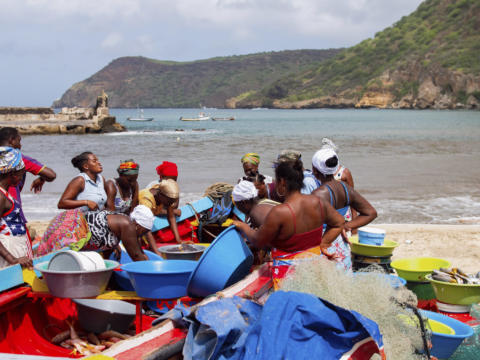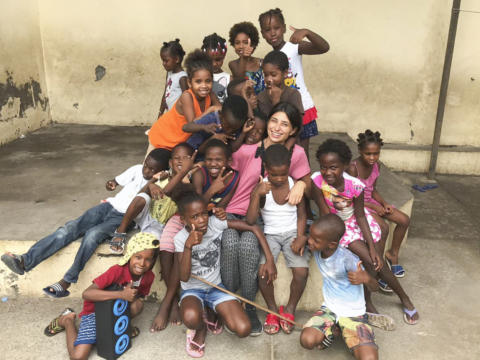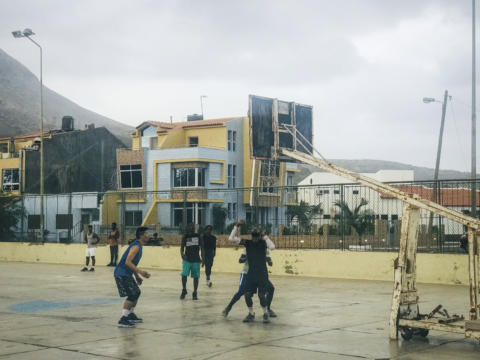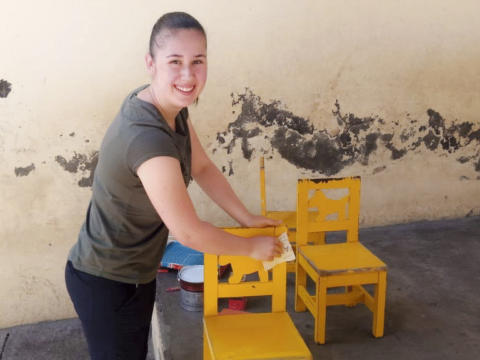Only 480€ per week!
Renovation Project
Tarrafal - Cape Verde
Renovation Project
Tarrafal - Cape Verde
Get involved in renovating local village schools and help the students have better learning conditions.
This project supports schools in and around Tarrafal by restoring and renovating their infrastructure in order to create better learning conditions for the students. We also help the schools by providing learning facilities where and when needed. The projects include renovating libraries, playgrounds and anything that might need a helping hand at the time!
Program Description
Through participating in this social project, you will make a difference to the local community by supporting the students at these schools.
Your work may involve tasks where you will be able to help to create a positive learning environment in the school. The project involves hard physical and manual labour, as you will be laying bricks, doing carpentry, painting, laying tiles, and landscaping/gardening. We may also involve in renovating buildings, painting, repairing the furniture, fixing equipment and so on.
The other side of this project involves a more artistic and relaxed environment. You may also get a chance to use your creative ideas to beautify the school surroundings. You will work alongside a local coordinator who provides guidance. This activity is fun, and we support the initiative and creativeness during the process.
Aims & Objectives
Our objective is to make a difference by helping the locals schools in and around Tarrafal by improving the learning conditions and facilities.
Schedule
Monday to Friday
Every morning after having breakfast, you will plan the project you will be engaged in, with the coordinator. Then you will set out to the project location to engage in your daily tasks.
You will be working alongside other participants and you will be guided by our coordinator throughout your time at the project.
Note: This schedule can be changed and/or amended depending on weather conditions, local conditions and unforeseen circumstances.
Participant Criteria & Requirements
Standard Requirements
Minimum age: –
Maximum age: –
Minimum English level: Basic
CRB required: On Signup
Passport copy required: On Signup
Resume copy required: No
Required qualification: None
Additional Requirements
Yellow fever vaccination is a mandatory requirement for all participants arriving in Cape Verde.
Participants below 18 are required to provide parental consent letters and participants above 65 should have the medical clearance.
Additional Equipment
Dress Code
- Cover up as much as possible in the spirit of the local culture to avoid embarrassment
- Your clothes must not be too short, too tight or too revealing. Kindly make sure your shoulders and legs are covered
- It is completely fine to wear western clothes as long as they fit the local standards
- Be thoughtful of the graphics, symbols or text printed on your clothing and avoid wearing clothing styles that might be inappropriate
- Be thoughtful to poor communities by not displaying expensive items and clothes
- Wearing local clothes could help you build a good working relationship with the community
Location
The city is named after the indigenous plant Tarrafe, (Tamarix senegalensis). Also called Mangui or Mangue, it is situated on the northern part of the island of Santiago. A fishing port situated on the northwestern coast and also is a municipality.
About the Accommodation
You can expect to share a room on single gender basis. The bathroom is shared and western toilets are available.
Food Arrangements
The meals will contain a mix of local and various types of Western food.
Facilities
There are ATMs, mini marts, some shops and restaurants available in the city center.
Activities & Events
No scheduled activities outside the program.
Sights & Surroundings
- Tarrafal beach
Transportation
From this location we do not provide free transport to other locations.
Quick Facts
Name: Republic of Cabo Verde
Population: 532,913 (2016)
Capital: Praia
Language: Portuguese, Cape Verdean Creole
Currency: Cape Verdean Escudo (CVE)
Time zone: CVT (UTC-1)
Country Information
The beautiful islands of the Cape Verde were initially uninhabited until it was discovered by the Portuguese in the 15th century. The country flourished during the 16th and the 17th centuries due to the Atlantic slave trade. But with the decline of the slave trade in the 19th century, the country experienced an economic crisis. Yet the location of the island made it survive as it became a significant commercial center in the 19th century as the location was perfect for re-supply of the ships. In the present day context, the economy of the country is mostly relying on the services provided by the country targeting the growing tourism industry.
Climate
Cape Verde has a mild climate compared to the mainland of Africa with an average high temperature of about 26 °C during February and 31 °C in September. The country has an irregular rain pattern in the months between August and October and it is in September that the country experiences its maximum rainfall. The country can boast about the rich vegetation and the forests that provides a rainforest habitat although the close proximity to the Sahara is makes most islands with no mountains mostly dry. The islands as initially were isolated, the existence of a number of endemic species mostly the birds and reptiles can be seen although the existence is threatened by the human developments.
Culture
As the country was discovered by the Portuguese, the culture is immensely influenced by them as the rural Portuguese practices are displayed in the social and cultural patterns of the country. The closeness to the church activities and the football games act as way of interaction between the locals for entertainment.
Transportation
By bus
For travelling within the islands, the most famous transportation is the minibuses which are known as “Yasi” which can accommodate around 12 to 14 passengers. In addition, the modified pickup truck and the cabs which are sometimes covered provide the transport facilities for shorter distances and in rural areas.
By Taxi
Taxis can mostly be found in the cities of Praia and Assomada, and they have unique colored taxis in these two cities, where taxis painted in beige are based in Praia and the taxis painted in white are based in Assomada. The taxis sometimes have a meter fixed to it although they hardly use it as the rates which are usually accepted are cheaper than the ones the metered taxis would count.





